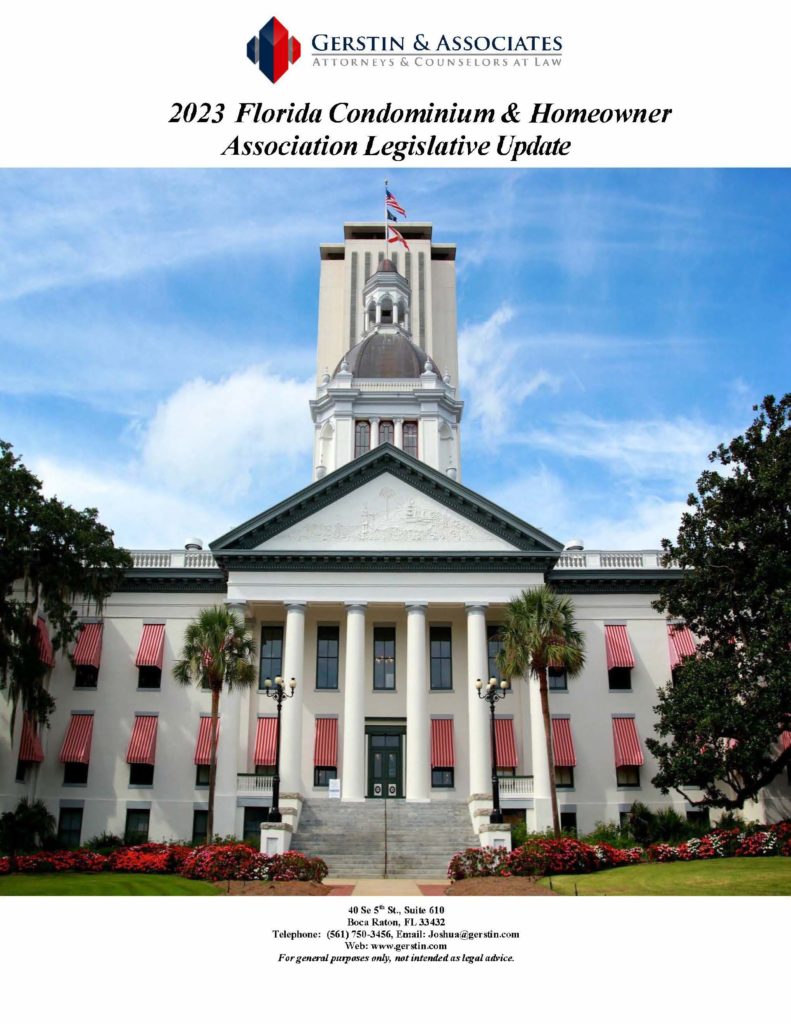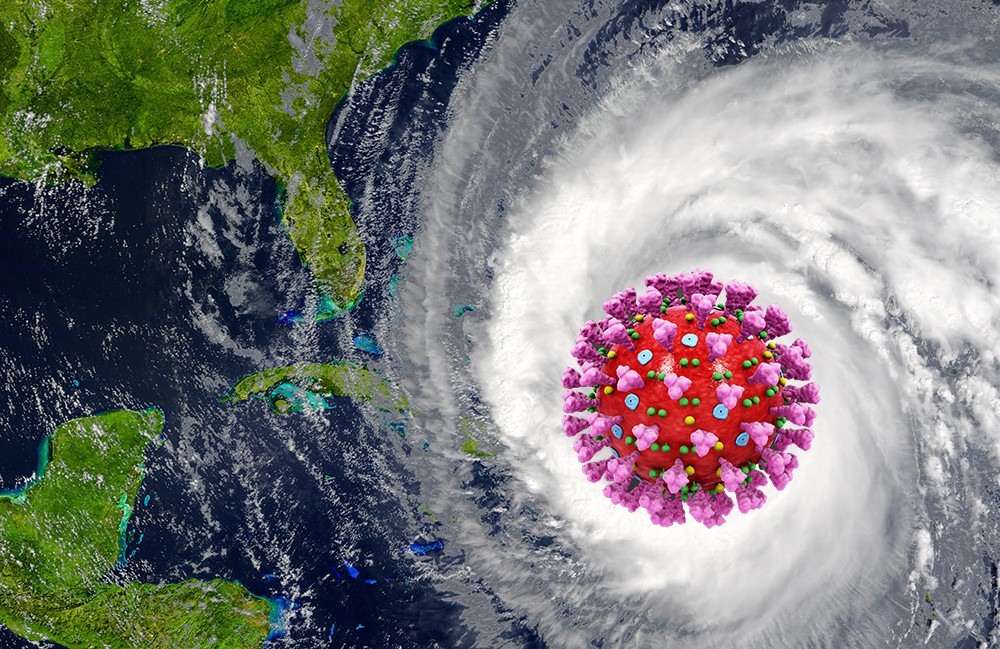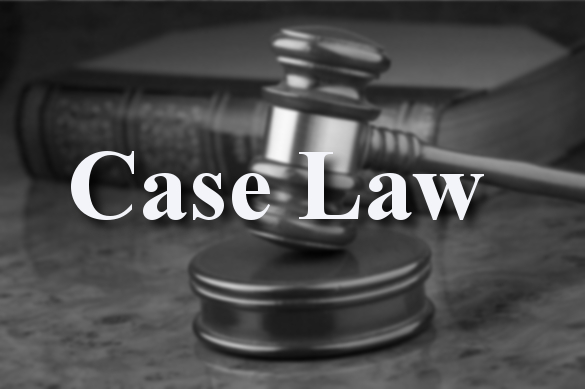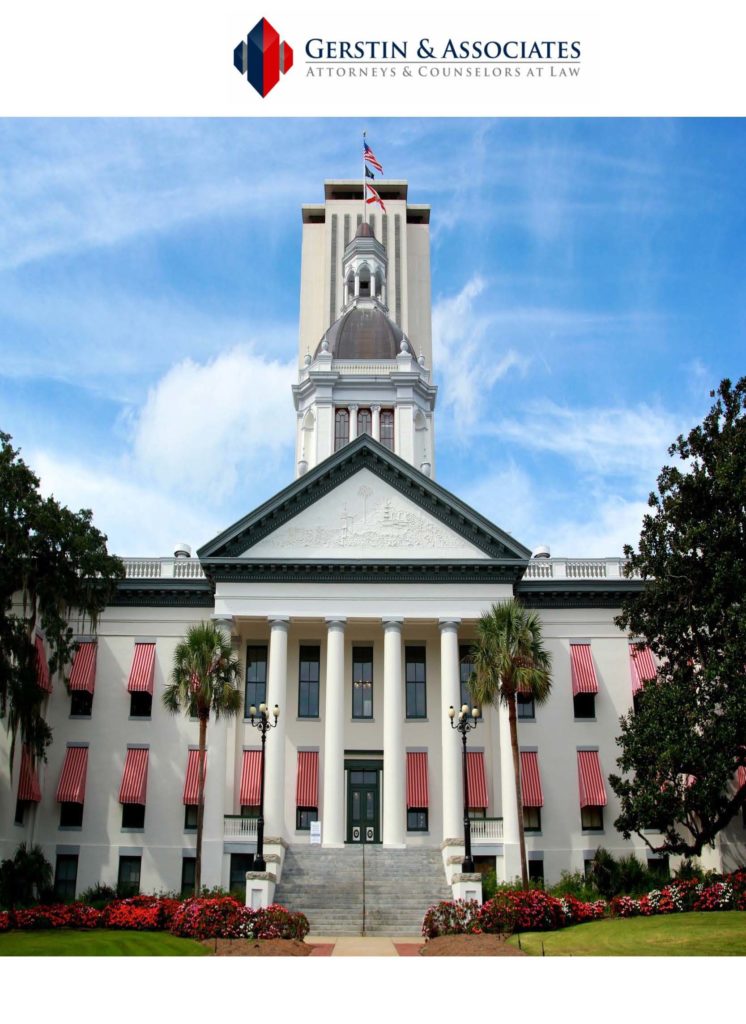Real Estate
2023 Florida Community Association Legislative Update

On May 5, 2023, Florida’s Legislature concluded its annual 60-day legislative session. Unlike previous legislative sessions, this year’s session garnered little media attention while the legislators were busy at work passing many laws impacting Florida’s community associations.
For the .pdf version of this article, click here.
Following is a list of the bills Governor Ron DeSantis recently signed into legislation:
1. Homeowner Associations. House Bill 919 (“Homeowners Association Bill of Rights”) (click here for the full bill). These laws will take effect on October 1, 2023.
Board meeting notices. All Board meeting notices must specifically list the meeting’s agenda.
Owner deposits. If a homeowners association collects a deposit from a member for any reason, including for a tenant or construction, and regardless if it is called a “security deposit,” the association must maintain all funds separately and not commingle them with association funds. Additionally, all funds deposited with the association must be returned within thirty days after receiving notice the reason for which the deposit was collected is complete. If requested by the owner, the association must provide an accounting of the funds deposited within seven (7) days of receiving the request.
Kickbacks. If an officer or director (or property manager) solicits or receives anything of value for him or his family from any person or entity providing goods or services to the Association may be immediately removed from the Board by the remaining Board of Directors. The violator is also subject to civil monetary fines. However, an officer, director, or manager may continue to accept food consumed at a business meeting with a value of less than twenty-five dollars ($25.00) per person or a service or good receipt in connection with the trade fair or education program.
Official Records. The law clarifies any parcel owner, or their authorized representative, may inspect Official Records.
Fines. The existing law was clarified to make it clear that fines may be levied for violations of the declaration, bylaws, or rules. Additionally, the notice to the member from the fining committee must include a description of the alleged violation, the specific action required to cure such violation, if applicable, and the date and location of the hearing. A parcel owner can attend a hearing by telephone or other electronic means. The letter from the finning committee after its hearing must include any applicable fines or suspensions the committee approved or rejected and how the parcel owner or any occupant, licensee, or invitee of the parcel owner may cure the violation, if applicable. All payments for fines are due within five days from the notice to the member.
Voting. Each of the following acts is considered a fraudulent voting activity and constitutes a misdemeanor of the first degree:
- Willfully and falsely swearing to, or affirming at oath or affirmation, or willfully procuring another person to falsely swear to, or affirm an oath or affirmation in connection with or arising out of, voting activities.
- perpetrating, or attempting to perpetrate, or aiding in the perpetration of, fraud in connection with a vote cast, to be cast, or attempted to be cast.
- Preventing a member from voting or preventing a member from voting as he or she intended, by fraudulently changing or attempting to change a ballot, ballot envelope, vote, or voting certificate of the member.
- Menacing, threatening, or using bribery or any other corruption to attempt, directly or indirectly, to influence, deceive, or deter a member when the member is voting.
- Giving or promising directly or indirectly anything of value to another member with the intent to buy the vote of that member or another member or to corruptly influence that member or another member in casting his or her vote. However, this does not apply to any food served which is to be consumed at the election rally or meeting or to any item of nominal value which is used as an election advertisement, including a campaign message designed to be worn by a member.
- Using or threatening to use direct or indirect force, violence or intimidation or any tactic of coercion or intimidation to induce or compel a member to vote or refrain from voting in an election or on a particular ballot measure.
2. Homeowner Associations. House Bill 437 (click here for the full bill). These laws took effect on July 1, 2023:
Flags. If displayed respectfully, a homeowner may display up to two (2) of the following flags:
- The United States flag.
- The official flag of the State of Florida.
- U.S. Army, Navy, Air Force, Marine Corps, Space Force, or Coast Guard flag.
- POW-MIA flag.
- A first responder flag.
Storage & Display of Items. An association may not restrict parcel owners or their tenants from installing, displaying, or storing any items on a parcel that are not visible from the parcel’s frontage or an adjacent parcel, including, but not limited to, artificial turf, boats, flags, and recreational vehicles.
3. Condominiums. Surfside “glitch” bill, reserves, and inspections. This legislation has already taken effect:
On June 9, 2023, Governor DeSantis signed the “glitch” bill to purportedly fix some issues with the recent “Surfside” related inspection law. The full text of the law is available here, and a .pdf of this portion of the article is available here. Unless otherwise indicated, this legislation takes effect immediately. As with many legislative efforts, determining the effectiveness of the legislation and the discovery of unintended consequences takes time. At the very least, the changes to the Structural Integrity Reserve Study law (SB 154) listed below are a good start:
Reserve Funding:
- Multi-condominium associations operating at least 25 condominiums can use a line of credit as an alternate funding source for reserve funding.
- Reserve funding must be based on the association’s most recent Structural Integrity Reserve Study.
- The requirements to waive reserves or use reserves for an alternate purpose (allowable only until 2025) has changed to a majority of the total membership from a majority of those present at a meeting in which quorum was attained.
- Inflation can be considered by an association when determining reserve funding.
- Depending on specific requirements, a 40 or 50-year certification may be used instead of the visual survey portion of a SIRS.
- The unduly harsh strict liability standard to find a director liable for a breach of fiduciary duty for not complying with the new reserve requirements has been changed. The new standard is now the more reasonable “willful and knowing.”
- Reserves are only required for components an association is responsible for according to its Declaration. Reserves are not needed for items whose useful life exceeds 25 years. However, deferred maintenance reserves for these items are still required.
- Along with architects and engineers, a reserve specialist can now perform the visual inspection portion of a SIRS.
- Exterior doors are now reserve components, and the floor and foundation are not unless the floor and foundation are part of the building’s “structure,” which, of course, they are.
Inspections:
- Insurance premiums are excluded from the 115% calculation that allows members to challenge a budget.
- The Florida Building Code is designated as authoritative to determine the height of a building.
- An association has a year or less (depending on local ordinances) to repair damage identified in an inspection.
- Fourteen days’ notice to members is required upon an association’s receipt from a local governing authority a milestone inspection is required. The notice must also include the date the milestone inspection must be completed.
- An architect and an engineer acting as a licensed design professional may conduct a milestone inspection.
- The definition of “substantial structural deterioration” was broadened to include “substantial structural weakness.”
- A local governing authority has the discretion to extend an inspection deadline for “good cause,” which at the least requires the association to have entered into a contract for a milestone inspection that cannot be completed by the deadline.
- No more than 45 days after receiving the inspection report from the architect or engineer, the association must post a summary on its website, mail it to the members, and make the summary or report available to renters.
- Community association managers no longer have to comply with the structural inspection laws solely because they manage a property “that has a building” on it.
- Local authorities can set a 25-year inspection requirement based on environmental conditions, such as proximity to a shoreline.
- Condominium units in which personal property is covered under a flood master policy or located above specific floors may not be required to have flood insurance.
- As of July 1, 2027, mediation is available to members for certain structural and life-safety disputes.
- Developers must provide prospective buyers with statements regarding milestone inspections, SIRS, and reserve studies, if applicable. The law introduces additional presale notice requirements in contracts to ensure buyer awareness.
4. Condominiums. Safety, Security and Crime Prevention. House Bill (HB) 837 overhauls Florida’s litigation landscape. The law is already in effect and is expected to reduce frivolous liability claims against residential associations (click here for full bill text):
When implemented by an association, the following safeguards exempt an association from liability if a third party commits a crime on their property:
- Security cameras at points of entry and exit that keep video retrievable for 30 days.
- Lighted parking available from dusk to dawn.
- Lighting in common areas, porches, walkways, and laundry rooms from dusk to dawn.
- Deadbolts measuring at least one inch on every door of every unit.
- Locking devices on every window and sliding door not used for community purposes.
- Locked gates at pool areas with fob or key access.
- Peepholes or viewers on doors that do not have windows or window next to doors
- By January 1, 2025, associations must have a Crime Prevention Through Environmental Design (CPTED) study performed by a law enforcement agency or a Florida Crime Prevention Through Environmental Design Practitioner (FCP). CPTED studies should be no older than 3 years old, and the association must substantially comply with the assessment.
- Associations must also provide their employees with safety and crime prevention training by January 1, 2025. This training must familiarize employees with security principles, devices, measures, and standards. After January 1, 2025, associations must train new employees within 60 days. The Florida Crime Prevention Training Institute of the Department of Legal Affairs will develop a proposed curriculum or best practices to implement the training.
Act Now!
Stay one step ahead of new legislation, recent case law, and new developments that may impact your community association by subscribing to the Gerstin & Associates newsletter.
Click Here to Subscribe to the Gerstin & Associates Newsletter
Fannie Mae’s Secret Blacklist of South Florida Condominium Associations.

In the wake of Surfside, some South Florida’s condominium associations cannot find lenders willing to lend for capital projects or to potential buyers. It’s doubtful South Florida’s condominium associations that restored, rehabilitated, and stabilized their operation can ever leave the list.
For more information:
Fannie Mae, Freddie Mac Keep Secret “Blacklist” of Properties (therealdeal.com)
Florida Condominium Living is About to Become Very Expensive.

–By Joshua Gerstin, Esq.
If you own a condominium in Florida, it is important to be aware of the significant cost increases condominium owners will face due to recent changes in Florida law and ever-increasing insurance premiums. In particular, the new Structural Integrity Law, with its mandated increases in reserve requirements and the skyrocketing cost of insurance, will cause many Florida condominium owners to sell their units and many condominium associations to pursue termination of their condominium associations.
The Structural Integrity Law was passed in response to the collapse of the Champlain Towers South condominium building in Surfside, Florida, in June 2021. The law requires all condominium associations in Florida to complete a structural inspection by a qualified engineer or architect and a reserve study by the end of 2021. Condominium associations are required to make any necessary repairs identified in the inspection.
The cost of the required inspections, reserve study and repairs can be significant. According to estimates from the Community Associations Institute, the cost of a structural inspection alone can range from $10,000 to $50,000 or more, depending on the size and complexity of the building. Repairs identified in the inspection can cost millions of dollars, and may require assessments or increases in monthly assessments to cover the costs.
In addition to the costs associated with the Structural Integrity Law, Florida condominium owners will also face increases in reserve requirements. The Structural integrity law prohibits the pooling of reserves for certain designated items or items identified as in need of repair by the structural inspection. Additionally, the law also removed the ability of condominium associations to partially fund or waive full funding of reserves.
The increase in reserve requirements will likely result in higher monthly assessments for condominium owners in associations that routinely chose not to fully fund their reserves. Condominium associations may need to levy special assessments to make up for any shortfall in reserve funds. These assessments can be a significant burden on condominium owners, particularly those who are already struggling financially.
Finally, condominium owners in Florida can expect to see exponential increases in their insurance premiums. Insurance companies are raising rates for condominium associations in response to the Champlain Towers South collapse and the resulting scrutiny of building safety and maintenance practices.
The new Structural Integrity Law, along with increases in reserve requirements and insurance premiums, will have a significant impact on the costs of owning a condominium in Florida. Condominium associations have options to mitigate these issues, but they have to act fast by taking steps NOW to ensure their condominium associations remain financially stable with a safe and secure living environment for their residents.
Act Now!
Stay one step ahead of new legislation, recent case law, and new developments that impact your community association by subscribing to the Gerstin & Associates newsletter.
Click Here to Subscribe to the Gerstin & Associates Newsletter
Protect Your Home’s Title (your biggest investment), for Free!

Due to the increase of information available online, criminals have been fraudulently recording deeds and stealing or refinancing people’s homes without their knowledge. Recently, the Palm Beach and Broward County Clerks have each established programs to alert residents when a deed to their property has been transferred, for free!.
No free or paid service, despite promises to the contrary, can stop a County Clerk from recording a deed, even a fraudulent one. These services do not prevent the fraud from happening. Instead, the rightful owners are alerted within 24 hours by email if there is a problem that needs to be addressed before it is too late.
Residents in Palm Beach and Broward can sign up for this free fraud prevention program as follows:
For Palm Beach County Residents:
www.mypalmbeachclerk.com/records/property-fraud-alert or call 800-728-3858.
For Broward County Residents:
Are the million-dollar PPP loans many PBC golf communities collected justified?
In the News:
Six golf country clubs in Palm Beach County – Hunters Run, Quail Ridge, Wycliffe, Old Palm, Banyan Cay and the Loxahatchee Club – may have received as much as $18 million in PPP loans through the Small Business Administration.
Six golf course communities are among the more than 3,000 businesses in Palm Beach County that received Payroll Protection Program (PPP) loans through the Small Business Administration (SBA).
An analysis of the loans released this week by the SBA shows that the six clubs may have received as much as $18 million. The SBA had been sued by a number of newspaper organizations over the identity of the loan recipients. When the applicants applied, they were told the loans would be public record.
The program was designed to keep employees on the payroll. If employers do that and comply with the loan conditions, the loans become grants and do not have to be repaid.
The SBA agreed to identify all recipients of loans in excess of $150,000 but only provided ranges of funds received, refusing to reveal the exact amount.
The data released by the SBA do not include the amount of the loan but rather the loan amount a bank has approved. The actual amount of a loan could be smaller than the approved amount. All amounts are in ranges.
Some golf course communities that accepted PPP loans in Palm Beach County have recently spent upward of $10 million on massive improvements to their clubhouses and golf courses.
The clubs that took the money include:
– Hunters Run ($2 million to $5 million) in Boynton Beach.
– Quail Ridge ($1 million to $2 million) in Boynton Beach.
– Wycliffe ($2 million to $2.5 million) in Wellington.
– Old Palm ($1 million to $2 million) in Palm Beach Gardens.
– Banyan Cay Resort Club ($700,000 to $2 million) in West Palm Beach.
– The Loxahatchee Club Homeowners Association ($150,000 to $300,000) in Jupiter.
Scores of other Palm Beach country clubs had applied for the PPP loans. Many were approved but decided to refuse to accept the money on both moral grounds and legal grounds after reading the fine print. Government auditors are expected to review how the money was spent and can ask for the money to be returned and penalties to be imposed if they find misrepresentations.
Fifty-seven country clubs in Florida accepted the PPP funds. According to CNBC, more than 400 country clubs and golf courses received loans throughout the country. The issue of whether it is appropriate for golf course communities to receive PPP loans has been debated.
Assessment revenue a factor
Joshua Gerstin, a Boca Raton lawyer who specializes in homeowner and condominium association law, said he expects one factor the SBA will consider is how much revenue a country club gets from its assessments.
“If it is mostly assessment driven, the country club might have a problem,” he said. “If members continued to pay their assessments, there was no real loss of revenue. But if much of it comes from dining and other sources that members pay outside of their assessments, they could be eligible.”
According to the SBA, businesses must certify that the loan is needed “to support ongoing” operations and that they are unable to access “other sources of liquidity” to support their ongoing operations.
Addison Reserve General Manager Michael McCarthy said once he and his board saw those revised requirements, they decided that it would be wrong to participate in the PPP program.
“There was no way I could certify that we needed it stay in business or that we didn’t have other sources of liquidity,” he noted.
Wycliffe, Quail Ridge: We preserved jobs
Hunters Run President Michael Soroka declined to comment on the issue. According to the SBA, Hunters Run and Banyan failed to provide data to indicate how many jobs were saved by the loans. Wycliffe was chastised on CNBC early Tuesday morning for accepting its loan. The Post has learned that the Wycliffe loan amount was $2 million. It was able to preserve 281 jobs. Wycliffe’s general manager, Rob Martin, released a statement to The Post that read:
“At Wycliffe, we are thankful to all of our employees for their hard work and dedication through these challenging times. We took PPP money because we care deeply about our team and wanted to make sure that we had the ability to provide them a regular paycheck. Following the legal parameters, we only requested and received enough to cover our payroll needs and did not use our loan in any way to disadvantage other companies. We are thankful that we qualified to receive money so that our employees and their families could make ends meet during these challenging times.”
Quail Ridge GM William Langley said the PPP loan was used as intended. He noted that Quail Ridge would have had to have laid off many of its 300 employees without the loan. “We are not a club with deep pockets,” he said.
The Club at Admiral’s Cove in Jupiter was one of those that returned the funds – $3.1 million. “We saw too many issues, both moral and legal,” said CEO Bret Morris. “We did not want to take the risks.” He said Admiral Cove was able to keep its 500 employees working, noting: “We found other things for them to do.”
2020 Hurricane Season, the Definitive Checklist for Florida’s Community Associations.
 – By Joshua Gerstin, Esq.
– By Joshua Gerstin, Esq.
(Click here for .pdf version with “checkable” fields for your ease of use!)
Hurricane season begins on June 1st and lasts 5 months, with storms typically peaking in August and September. Due to COVID-19, this hurricane season will be unlike all others. Properly preparing for this unique hurricane season could truly be a lifesaver. The following hurricane preparation checklist is a combination of over twenty years of community association legal experience and new COVID-19 precautions:
Things to do now:
COVID-19 Related Hurricane Checklist:
— Start stocking up on cleaning supplies now. Most stores have limited cleaning supplies or only allow a limited number of purchases. It is going to take a lot longer to obtain all the cleaning supplies you will need.
— An abundance of hand Sanitizer, soap, disinfectant spray, disinfectant wipes and face masks are the COVID-19 supplies your community association will need if a hurricane strikes.
— Plan for extended power outages (generator fuel, ice, flashlights, extra petty cash and installing a landline). Although FPL has been burying power lines and improving the electrical grid, additional workers will be needed to restore power after a hurricane. COVID-19 testing of these workers will cause delays and will limit the size of this additional workforce as infected workers are turned away.
— Purchase locks and non-electronic security equipment to keep buildings and common areas secure from vandalism or looting during an extended power outage.
— Go to the app store for your mobile phone and download the official FEMA app. A face-to-face meeting with an adjuster after a hurricane strikes is unlikely. FEMA has made available a phone app that can allow insurance companies to provide estimates without an in-person visit. When the app is running, it can take photos and measurements and gather additional information as you walk through your common areas.
— Confirm shelter locations, evacuation routes and remind residents to take their pets if they evacuate. Due to COVID-19 shelters and evacuation routes across Florida have changed. Officials are considering protocols for shelters that range from separating people based on temperature checks to non-congregated sheltering in hotels. Direct residents to https://www.cdc.gov/disasters/hurricanes/covid-19/public-disaster-shelter-during-covid.html for further information about staying virus free in a shelter.
— Establish a designated area that allows for social distancing where residents can meet for more information after the disaster.
— Inform residents in writing the extent of help the association will be providing (and not providing) during and after a hurricane. Urge your residents to begin their own preparation and evacuation plans.
— Update your contact list of owners, board members and staff. Ensure the list contains the correct contact information for seasonal residents. Print out the list and place it in a safe location (having it on your computer will do you no good when the power is out).
— Similar to the children’s game “telephone”, establish amongst the board of directors a chain of command for communications in the event a hurricane strikes. When a hurricane strikes, time should not be wasted by having to contact each board member or answer each board member’s non-emergency information inquiry.
— Update your vendor list, print it out and place it in a safe location (having it on your computer will do you no good when the power is out).
— Ensure your building’s plans and blueprints are in a safe location with easy access for first responders or insurance agents. Highlight shut-off valves, power-boxes, lift stations and debris staging areas.
— Service your association’s lift stations now to avoid sewage overflow if a hurricane strikes.
— Confirm all of your association’s data is being regularly backed up to the cloud or offsite.
— Copies of your association’s insurance policies, claims filing information and insurance agent’s contact information should be in paper form and secured in a safe location.
— Keep handy a list of all bank account numbers, branch locations and authorized association signatories. Have the board authorize an increased petty cash amount to be stowed away with your hurricane supplies. Credit cards, debit cards and computer checks will not be available if the power is out.
— Enter into contracts with vendors you will use during an emergency (water removal, debris cleanup repairs, etc.) to ensure they are available immediately after an “all clear” is given. Hurricane Irma struck during the same season a hurricane hit Puerto Rico and Texas. Many community associations were unable to secure vendors for the cleanup of debris and water because their vendor was assisting with other hurricanes.
— Pre-determine a staging area for debris and contract for debris dumpsters.
— Print out the instructions for updating the Association’s website and keep them in a safe location. Designated a member or director to provide frequent website updates regarding your association after a hurricane strikes. Off-site or seasonal residents will be searching for information and you do not want them contacting management if possible.
— Print out the instructions for updating the Association’s voicemail and keep them in a safe location. Residents and their loved ones will be calling for information and your association’s outgoing message on its voicemail is an effortless way to keep them updated.
— Make plans to shut down and secure clubhouses and other amenities, store furniture and to shutoff electric and water.
— Confirm all drainage areas and lines are working at full capacity.
— With proper socially distancing, establish a designated area within the association for posting hurricane-related updates.
— If you have a manned gate, make sure the attendants and the residents know at what point the attendants will be sent home and that the gates will be locked in the open position to provide emergency ingress and egress.
— Buy battery operated walkie-talkies and consider having a landline installed. Past hurricanes have taught us battery-operated walkie-talkies and a landline are the only communication methods that can be relied on if the power goes out.
— Stock up on and securely store gasoline, tarps, duct tape, sandbags, submersible water pumps, chain saws, water, flashlights, weather radio, batteries, and a video camera for documenting storm damage.
— Consult your elevator company on how to properly secure your association’s elevators.
— Ensure you have keys to each unit in your building.
— Have your Association’s trees trimmed, including the removal of all coconuts, seeds or potential hurricane “missiles”.
— Have all dead and dying trees removed. Consider waiting to replant any new trees until after the hurricane season. All new trees should be firmly staked and secured
— Identify residents who need special care and contact those owners and their families to determine if arrangements have been made for them. Remind all residents the elevators may need to be shut down or may not operate for an extended period due to a power outage.
— Inform residents in writing what to expect from the association before, during and after a hurricane strikes. Advise residents to communicate with friends and relatives elsewhere who will be concerned. Association offices oftentimes become overwhelmed after a storm with relatives calling from out of state to check on them. In the event of a mandatory evacuation, remind owners to keep all receipts related to additional living expenses, such as hotel accommodations and gasoline if an evacuation is mandated. These receipts may be reimbursable as part of an eventual insurance claim.
When a hurricane warning has been issued:
— Bring all objects inside that may be tossed about by wind or rain.
— Check all drainage areas and remove any debris that would restrict water flow.
— Lower the water in all pools, fountains and other water features.
— Shut down, close and securely lock all pools, water pumps (pools, fountains irrigation, etc.) and recreation areas.
— Videotape or photograph the building and all common areas with a date stamp to accurately document the property’s pre-storm condition for insurance purposes.
— Ensure all construction dumpsters are empty. If possible, arrange to have your regular dumpster emptied.
— Strategically place sandbags in areas where flooding is anticipated.
After the hurricane has passed:
— Stay calm, triage the association and focus only on life/safety issues.
— After the life safety issues are stabilized, focus on damage mitigation and recording the remediation work with photographs and video. Contact your vendors to come into the association to begin removing debris and items that are wet (drywall).
— Consider shadowing contractors and vendors as they inspect or work on individual units to avoid stolen property claims later.
— Continue documenting and recording the damage and remediation efforts for insurance purposes.
— In times of need, unscrupulous people always try to take advantage. Avoid vendors, contractors and third-party/private insurance adjusters soliciting your association’s business. If you have no choice, take the time to fully vet each one before signing anything.
— With the assistance of an attorney experienced in community association hurricane claims (joshua@gerstin.com), contact and file a claim with your association’s insurance carrier.
Click here for .pdf version with “checkable” fields for your ease of use!
Stay Informed!
Click Here to Subscribe to the Gerstin & Associates Newsletter
2019 Florida Community Association Case Law Year in Review.
 Based on a seemingly low media profile many people wrongfully assumed Florida’s court system had little or no impact on their community association in 2019. Although lacking in “name plate” cases the following case law decided in 2019 will have a meaningful impact on Florida’s condominium and homeowner associations (click here for .pdf of this article):
Based on a seemingly low media profile many people wrongfully assumed Florida’s court system had little or no impact on their community association in 2019. Although lacking in “name plate” cases the following case law decided in 2019 will have a meaningful impact on Florida’s condominium and homeowner associations (click here for .pdf of this article):
2019 Case Law Decisions
• Condominium Board Member Term Limits.
- Is the 8 year directorship limit retroactive?
- Only one arbitration case so far on this issue involving a community association. In the arbitration case, the association’s governing documents did not contain the “Kaufmann Language”.
- According to the arbitration case of Glantz v. Hidden Lake, Case No.: 2019-01-5048, without Kaufmann Language the term limits count starts from the date the legislation passed forward.
- With Kaufmann Language, one can assume the opposite result.
• Former Owner Awarded Attorneys’ Fees Against Community Association.
- After an association filed a lawsuit against the two title owners of a unit to recover unpaid assessments, the unit owners denied the allegations and asserted their right to recover attorneys’ fees and costs.
- The two unit owners sold the unit to a third party.
- Over a year passed without any activity in the case. This typically happens with an inattentive attorney or unengaged board of directors.
- Judge dismisses the association lawsuit for “lack of prosecution”. One of the former unit owners then filed a motion for prevailing party attorneys’ fees pursuant to the Declaration of Condominium and Florida Statute §718.106 and won.
- Don’t ignore old case you might consider moot, close out the cases properly or face the possible expensive consequences. Tison v. Clairmont Condo. F Ass’n, No. 4D19-117, 2019 Fla. App. LEXIS 16769 (4th DCA Nov. 6, 2019).
• Developer allowed to use working fund contributions for operating expenses.
- Working fund contributions used to be considered as benefiting the association, not its a developer. That sentiment recently changed in a recent case decided by Florida’s Fourth District Court of Appeal involving Valencia Reserve, a residential community of single-family homes in Palm Beach County.
- While still in control of the association, the developer used Working Fund Contributions collected at each closing to satisfy the Association’s operating deficit.
- After turnover, the HOA sued the developer claiming the HOA Act prohibited the developer’s use of working fund contributions to satisfy the deficit.
- Florida’s Fourth District Court of Appeals affirmed the lower court’s ruling finding that the developer’s use of the working fund contributions was permitted by both the Declaration and the HOA since they were not budgeted for designated “capital contributions”.
- Valencia Reserve Homeowners Ass’n v. Boynton Beach Assocs., XIX, LLLP, 44 Fla. L. Weekly D2208 (Fla. 4th DCA August 28, 2019).
• Associations Must Comply with the ADA and Florida’s Accessibility Code.
- An elderly patient visiting a medical facility in a strip mall fell near a curb in the parking lot and sued the medical facility, the manager of the mall and the owner of the mall based on a premises liability negligence claim. In support of his claim, the injured patient relied up a provision in the Florida Accessibility Code of Building Construction requiring the shortest accessible route between the handicapped parking space where he parked and the entrance to the medical facility. This requirement is not in the ADA.
- Florida’s Second Court of Appeals held the jury should hear both codes and determine the appropriate level of care.
- All common areas should be surveyed by a profession in the ADA and Florida’s accessibility code.
- Personal liability for directors and possibly no insurance coverage for any such lawsuits.
- Krueger v. Quest Diagnostics, Inc., MPN, Ltd. Liab. Co., 44 Fla. L. Weekly D2318 (Fla. 2d DCA September 13, 2019) .
• Associations Beware of Mandatory Arbitration Provisions in Governing Documents.
- The Declaration of Covenants, Conditions and Restrictions for the Ellingsworth Community contain a mandatory arbitration provision which requires that disputes be subject to negotiation in good faith, mediation, and a demand for arbitration within thirty days after termination of the mediation proceeding. If this procedure is not followed, the dispute is waived.
- When a homeowner modified the landscaping surrounding her home without authorization, the homeowners association demanded restoration to its previous condition. The homeowner refused, and she and the association proceeded to negotiation and mediation. The mediation resulted in an impasse. Rather than initiating arbitration, the homeowners association filed suit in state circuit court where it argued that despite the clear terms of the governing Declaration, Florida Statute § 720.311 allowed for a legal filing, rather than arbitration.
- The Court found that the Declaration and § 720.311 both provided for arbitration, but that the Statute did not supersede the Declaration’s mandatory arbitration provision and allow for filing of a lawsuit. Since the Association failed to submit the dispute to arbitration within thirty days of the mediation impasse, it waived its claim against the homeowner. The Association’s claim was dismissed with prejudice and judgment entered in favor of the homeowner.
- The Court found the Statute did not supersede the Declaration’s mandatory arbitration provision and allow for filing of a lawsuit. Since the Association failed to submit the dispute to arbitration within thirty days of the mediation impasse, it waived its claim against the homeowner. The Association’s claim was dismissed with prejudice and judgment entered in favor of the homeowner.
- Have an attorney review your governing documents and propose amendments to remove antiquated and expensive provisions.
- Guan v. Ellingsworth Residential Cmty. Ass’n, No. 5D18-3633, 2019 Fla. App. LEXIS 12940, at *1 (5th DCA Aug. 23, 2019).
• Unit Owners’ Defamation Lawsuit, Board Members Beware.
- A condominium association’s attorneys sent a cease and desist letter to a unit owner and provided a copy of the letter to the condominium association client. The unit owner who was the target of the cease and desist letter then sued the association’s attorneys in state circuit court for defamation.
- The court dismissed the defamation case because providing a copy of the cease and desist letter to its client did not amount to the publication required under the law of defamation. The court viewed the letter as a statement made by the attorneys to their client as part of the attorney-client relationship and analogous to the situations where there was no publication to a third party because the communication was tantamount to the principal talking to itself.
- It is important that community association directors and managers keep in mind their communications with association counsel are protected by the attorney-client privilege, are confidential, and should not be disclosed to third parties, including non-director unit owners. Disclosing such privileged communications to third parties may result in the waiver of the privilege. In addition, it is also important to take precautions to avoid potential defamation suits whenever possible as these are one of the most filed actions in the community association setting. Hoch v. Loren, 44 Fla. L. Weekly D1494 (Fla. 4th DCA June 12, 2019) .
FHA Issues New Condominium Approval Rule, Finally!
In an effort to promote affordable and sustainable home ownership, especially among credit-worthy first-time buyers, the Federal Housing Administration today published a long-awaited final regulation, and policy implementation guidance, establishing a new condominium approval process. Some of the highlights are (click here to download the new regulations):
- A new single-unit approval process or individual condominium units to be eligible for FHA-insured financing;
- The re-certification requirement for approved condominium projects is extended from two to three years;
- More more mixed-use projects to be eligible for FHA insurance.
Single Family Policy Handbook Guidance
FHA’s new Single Family Handbook sections published today provide the additional requirements that lenders and other industry participants need in order to implement FHA’s new policy, including requirements for single-unit approvals, minimum owner occupancy requirements, and commercial/non-residential space limits.
Single-Unit Approvals
As of October 15, FHA will insure mortgages for selected condominium units in projects that are not currently approved. An individual unit may be eligible for Single-Unit Approval under the following conditions:
- The individual condominium unit is located in a completed project that is not approved;
- For condominium projects with 10 or more units, no more than 10 percent of individual condo units can be FHA-insured; and projects with fewer than 10 units may have no more than two FHA-insured units.
Minimum Owner-Occupancy Requirements
FHA will require that approved condominium projects have a minimum of 50 percent of the units occupied by owners for most projects.
FHA Insurance Concentration in Condominium Projects
FHA will only insure up to 50 percent of the total number of units in an approved condominium project.
Commercial/Nonresidential Space Limits
FHA will require that the commercial/non-residential space within an approved condominium project not exceed 35 percent of the project’s total floor area.
(click here to download the new regulations)
2019 Florida Condominium & Homeowner Association Legislative Update
 2019 Florida Condominium & Homeowner Association Legislative Update
2019 Florida Condominium & Homeowner Association Legislative Update
Click here for .pdf version of this article
Based on the seemingly low media profile of recently passed legislation pertaining to community associations, many people wrongfully assume the latest session of Florida’s legislature will have little or no impact on their community association. To the contrary, although lacking in “name plate” legislation, the following recently passed legislation goes into effect on July 1, 2019 (unless otherwise noted) and will have a meaningful impact on Florida’s condominium and homeowner associations:
HB 829 – Attorney Fees in Challenges to Local Ordinances. Thanks to HB 829 it is now easier for your community association to “fight city hall”. Attorneys’ fees awards are available to prevailing parties in lawsuit brought against a local ordinance that allegedly violates state or Federal preemptions. Click here for a copy of the new law.
HB 1159 – Tree Trimming. Other than mangrove trees, local governments cannot require a permit for pruning, trimming and removal of vegetation and trees, if the tree or vegetation is certified as presenting a danger by the International Society of Arboriculture. Local governments are also forbidden from requiring the removed trees or vegetation to be replanted. A property owner year-round can request an electric utility maintain vegetation on property adjacent to the electric utility’s right-of-way without notice or permission from the local government. This would only apply to situations when it is necessary for power restoration or when the vegetation is threatening to cause a power outage. Click here for a copy of the new law.
SB 82 – Vegetable Garden Preemption. Local governments are prohibited from regulating vegetable gardens on residential property. This prohibition does not apply to general regulations that are not specific to vegetable gardens, such as ordinances regulating fertilizer, water use and invasive species. Click here for a copy of the new law.
SB-1666 – Anchoring & Mooring. The legislation directs the Florida Fish & Wildlife Commission to study impacts of long term storage of vessels anchored and moored outside of mooring fields; create “no-discharge zones” for sewage dumping near certain waterbodies near rural areas; require boater safety identification cards for boats 10 horsepower and above; and designate a portion of registration fees collected by counties for the Marine Resources Conservation Trust Fund. Click here for a copy of the new law.
HB 7103 – Sprinkler Retrofitting. Allows condominium associations to continue to vote to waive fire sprinkler system retrofitting requirements until January 1, 2024, at which time local authorities may require a condominium association to retrofit fire sprinkler systems or install an engineered life safety system. Click here for a copy of the new law.
HB 369 – Sober Homes. The bill continues to tighten up sober home standards and address unintended consequences of previously passed legislation. The bill exempts “Oxford Homes” from certification requirements, strengthens patient brokering and deceptive practices statutes, provides for certification and background checks of peer specialists, expands background check requirements for recovery residence administrative personnel and expands violations eligible for exemption, and covers residences that have day/night treatment centers. Click here for a copy of the new law.
SB- 182 Medical Marijuana. If it’s for medical purposes, does it fall under the ADA? If so, does your community association have to allow marijuana smoking where cigarette smoking is permitted? The legislation permits the use of smokable medical marijuana. The bill allows minors to smoke medical marijuana if they are terminally ill and smoking marijuana is approved by a second physician. Patients are limited to 2.5 ounces every 35 days, unless the Department of Health approves an increase at a patient’s request. Click here for a copy of the new law.
HB-311 Autonomous Vehicles. Is your community association “drone and autonomous vehicle ready”? Click here to obtain our report on how your community association can maximize the inevitable onslaught of drones and autonomous vehicles. The new law requires seeks to have Florida lead the country in autonomous vehicle technology by establishing: minimum insurance thresholds, a prohibition on levying of fines or fees by local entities (with the exception of seaports and airports), minimum driving conditions for the use of any automatic driving systems and on-demand autonomous networks. Click here for a copy of the new law.
Stay one step ahead of new legislation, recent case law and new developments that impact your community association.
} Name:
} Mailing address:
} E-mail address:
} Community name:
} Position on board, if any:
} Fax this completed page to (561) 750-8185 or email the above information to joshua@gerstin.com.

